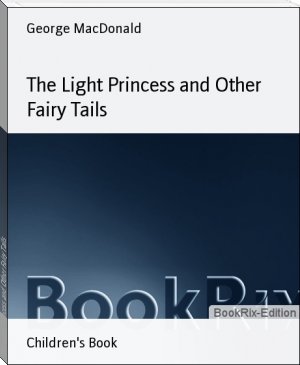The Light Princess and Other Fairy Tails - George MacDonald (best books to read now .TXT) 📗

- Author: George MacDonald
Book online «The Light Princess and Other Fairy Tails - George MacDonald (best books to read now .TXT) 📗». Author George MacDonald
I. WHAT! NO CHILDREN?
Once upon a time, so long ago that I have quite forgotten the date, there lived a king and queen who had no children.
And the king said to himself, "All the queens of my acquaintance have children, some three, some seven, and some as many as twelve; and my queen has not one. I feel ill-used." So he made up his mind to be cross with his wife about it. But she bore it all like a good patient queen as she was. Then the king grew very cross indeed. But the queen pretended to take it all as a joke, and a very good one too.
"Why don't you have any daughters, at least?" said he. "I don't say
sons ; that might be too much to expect."
"I am sure, dear king, I am very sorry," said the queen.
"So you ought to be," retorted the king; "you are not going to make a virtue of that , surely."
But he was not an ill-tempered king, and in any matter of less moment would have let the queen have her own way with all his heart. This, however, was an affair of state.
The queen smiled.
"You must have patience with a lady, you know, dear king," said she.
She was, indeed, a very nice queen, and heartily sorry that she could not oblige the king immediately.
The king tried to have patience, but he succeeded very badly. It was more than he deserved, therefore, when, at last, the queen gave him a daughter-as lovely a little princess as ever cried.
II. WON'T I, JUST?
The day drew near when the infant must be christened. The king wrote all the invitations with his own hand. Of course somebody was forgotten.
Now it does not generally matter if somebody is forgotten, only you must mind who. Unfortunately, the king forgot without intending to forget; and so the chance fell upon the Princess Makemnoit, which was awkward. For the princess was the king's own sister; and he ought not to have forgotten her. But she had made herself so disagreeable to the old king, their father, that he had forgotten her in making his will; and so it was no wonder that her brother forgot her in writing his invitations. But poor relations don't do anything to keep you in mind of them. Why don't they? The king could not see into the garret she lived in, could he?
She was a sour, spiteful creature. The wrinkles of contempt crossed the wrinkles of peevishness, and made her face as full of wrinkles as a pat of butter. If ever a king could be justified in forgetting anybody, this king was justified in forgetting his sister, even at a christening. She looked very odd, too. Her forehead was as large as all the rest of her face, and projected over it like a precipice. When she was angry her little eyes flashed blue. When she hated anybody, they shone yellow and green. What they looked like when she loved anybody, I do not know; for I never heard of her loving anybody but herself, and I do not think she could have managed that if she had not somehow got used to herself. But what made it highly imprudent in the king to forget her was-that she was awfully clever. In fact, she was a witch; and when she bewitched anybody, he very soon had enough of it; for she beat all the wicked fairies in wickedness, and all the clever ones in cleverness. She despised all the modes we read of in history, in which offended fairies and witches have taken their revenges; and therefore, after waiting and waiting in vain for an invitation, she made up her mind at last to go without one, and make the whole family miserable, like a princess as she was.
So she put on her best gown, went to the palace, was kindly received by the happy monarch, who forgot that he had forgotten her, and took her place in the procession to the royal chapel. When they were all gathered about the font, she contrived to get next to it, and throw something into the water; after which she maintained a very respectful demeanour till the water was applied to the child's face. But at that moment she turned round in her place three times, and muttered the following words, loud enough for those beside her to hear:-
"Light of spirit, by my charms,
Light of body, every part,
Never weary human arms-
Only crush thy parents' heart!"
They all thought she had lost her wits, and was repeating some foolish nursery rhyme; but a shudder went through the whole of them notwithstanding. The baby, on the contrary, began to laugh and crow; while the nurse gave a start and a smothered cry, for she thought she was struck with paralysis: she could not feel the baby in her arms. But she clasped it tight and said nothing.
The mischief was done.
III. SHE CAN'T BE OURS
Her atrocious aunt had deprived the child of all her gravity. If you ask me how this was effected, I answer, "In the easiest way in the world. She had only to destroy gravitation." For the princess was a philosopher, and knew all the ins and outs of the laws of gravitation as well as the ins and outs of her boot-lace. And being a witch as well, she could abrogate those laws in a moment; or at least so clog their wheels and rust their bearings, that they would not work at all. But we have more to do with what followed than with how it was done.
The first awkwardness that resulted from this unhappy privation was, that the moment the nurse began to float the baby up and down, she flew from her arms towards the ceiling. Happily, the resistance of the air brought her ascending career to a close within a foot of it. There she remained, horizontal as when she left her nurse's arms, kicking and laughing amazingly. The nurse in terror flew to the bell, and begged the footman, who answered it, to bring up the house-steps directly. Trembling in every limb, she climbed upon the steps, and had to stand upon the very top, and reach up, before she could catch the floating tail of the baby's long clothes.
When the strange fact came to be known, there was a terrible commotion in the palace. The occasion of its discovery by the king was naturally a repetition of the nurse's experience. Astonished that he felt no weight when the child was laid in his arms, he began to wave her up and-not down, for she slowly ascended to the ceiling as before, and there remained floating in perfect comfort and satisfaction, as was testified by her peals of tiny laughter. The king stood staring up in speechless amazement, and trembled so that his beard shook like grass in the wind. At last, turning to the queen, who was just as horror-struck as himself, he said, gasping, staring, and stammering,-
"She can't be ours, queen!"
Now the queen was much cleverer than the king, and had begun already to suspect that "this effect defective came by cause."
"I am sure she is ours," answered she. "But we ought to have taken better care of her at the christening. People who were never invited ought not to have been present."
"Oh, ho!" said the king, tapping his forehead with his forefinger, "I have it all. I've found her out. Don't you see it, queen? Princess Makemnoit has bewitched her."
"That's just what I say," answered the queen.
"I beg your pardon, my love; I did not hear you.-John! bring the steps I get on my throne with."
For he was a little king with a great throne, like many other kings.
The throne-steps were brought, and set upon the dining-table, and John got upon the top of them. But he could not reach the little princess, who lay like a baby-laughter-cloud in the air, exploding continuously.
"Take the tongs, John," said his Majesty; and getting up on the table, he handed them to him.
John could reach the baby now, and the little princess was handed down by the tongs.
IV. WHERE IS SHE?
One fine summer day, a month after these her first adventures, during which time she had been very carefully watched, the princess was lying on the bed in the queen's own chamber, fast asleep. One of the windows was open, for it was noon, and the day so sultry that the little girl was wrapped in nothing less ethereal than slumber itself. The queen came into the room, and not observing that the baby was on the bed, opened another window. A frolicsome fairy wind, which had been watching for a chance of mischief, rushed in at the one window, and taking its way over the bed where the child was lying, caught her up, and rolling and floating her along like a piece of flue, or a dandelion-seed, carried her with it through the opposite window, and away. The queen went down-stairs, quite ignorant of the loss she had herself occasioned.
When the nurse returned, she supposed that her Majesty had carried her off, and, dreading a scolding, delayed making inquiry about her. But hearing nothing, she grew uneasy, and went at length to the queen's boudoir, where she found her Majesty.
"Please, your Majesty, shall I take the baby?" said she.
"Where is she?" asked the queen.
"Please forgive me. I know it was wrong."
"What do you mean?" said the queen, looking grave.
"Oh! don't frighten me, your Majesty!" exclaimed the nurse, clasping her hands.
The queen saw that something was amiss, and fell down in a faint. The nurse rushed about the palace, screaming, "My baby! my baby!"
Every one ran to the queen's room. But the queen could give no orders. They soon found out, however, that the princess was missing, and in a moment the palace was like a beehive in a garden; and in one minute more the queen was brought to herself by a great shout and a clapping of hands. They had found the princess fast asleep under a rose-bush, to which the elvish little wind-puff had carried her, finishing its mischief by shaking a shower of red rose-leaves all over the little white sleeper. Startled by the noise the servants made, she woke, and, furious with glee, scattered the rose-leaves in all directions, like a shower of spray in the sunset.
She was watched more carefully after this, no doubt; yet it would be endless to relate all the odd incidents resulting from this peculiarity of the young princess. But there never was a baby in a house, not to say a palace, that kept the household in such constant good-humour, at least below-stairs. If it was not easy for her nurses to hold her, at least she made neither their arms nor their hearts ache. And she was so nice to play at ball with! There was positively no danger of letting her fall. They might throw her down, or knock her down, or push her down, but couldn't let





Comments (0)